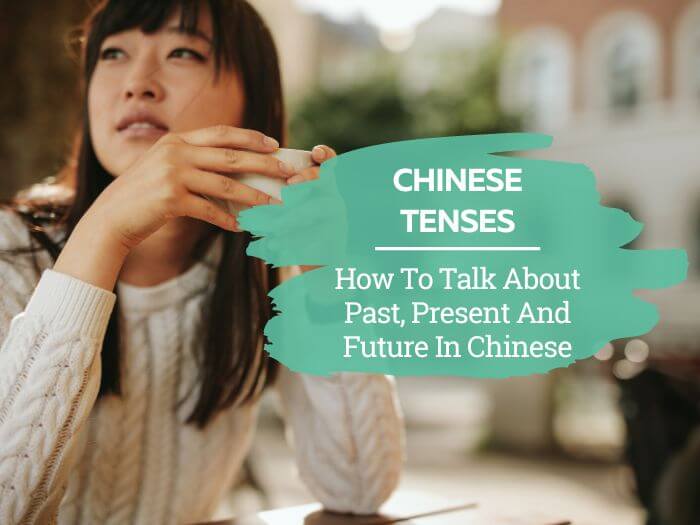When you learn Chinese, you quickly realise that it's extremely different to English in a variety of ways. One example of this can be found in how the two languages express notions of time.
The way Chinese talks about when actions take place is actually very simple, although it will feel unfamiliar to you at first because it doesn’t work the same way as in English.
So to help you start talking about the past, the present and the future with confidence, in this post, I go into all the details of Chinese tenses.
Pro Tip
By the way, if you want to learn Chinese fast and have fun, my top recommendation is Chinese Uncovered which teaches you through StoryLearning®.
With Chinese Uncovered you’ll use my unique StoryLearning® method to learn Chinese through story…not rules. It’s as fun as it is effective. If you’re ready to get started, click here for a 7-day FREE trial.
Table of Contents
Talking About Time In Chinese – An Overview

The title of this post is “Chinese Tenses”, but in fact, this is a little misleading since Chinese doesn’t have tenses.
Chinese is a language without inflection, which is a fancy way of saying that words don’t change according to grammatical function.
English has some inflection. For example, we add an “s” to nouns to indicate plurals, and verbs change according to who does the action and when the action takes place.
Languages like French, Italian and Spanish inflect more than English because they have more verb forms depending on who does the action and when it’s done. Other languages like German and Russian also have cases, adding yet another layer of inflection.
Chinese, though, doesn’t have any of this. Words in Chinese never change, so nouns are the same whether they are singular or plural, there are no cases and Chinese verbs don’t change according to whether something happens in the past, present or future.
So how does Chinese indicate when things happen?
The short answer is that you get this information from other words in the sentence.
At the most basic level, in Chinese, you say the equivalent of “I go yesterday”, “I go today” or “I go tomorrow”. The information about when the action happens comes from words like “yesterday”, “today” and “tomorrow” rather than from the form of the verb.
Hence no tenses.
At the same time, Chinese also has words called “aspect markers”, particles like 了 le and 过 guo, that can help you understand when an action takes place. However, these shouldn’t be thought of as “Chinese tenses”, as we’ll see later in this post.
At least that’s the theory, so now let’s jump in and look at some examples of how it all works in practice.
Basic Sentences With Chinese Time Words
Look at these simple sentences:
- 我昨天吃炒面wŏ zuótiān chī chăomiàn (I ate fried noodles yesterday)
- 我每天都吃炒面 wŏ mĕi tiān dōu chī chăomiàn (I eat fried noodles every day)
(Here, 都 dōu is optional. Its basic meaning is “all”, and it is often paired with 每 mĕi – meaning “each” or “every” – to make the sentence feel more complete.)
- 我明天吃炒面 wŏ míngtiān chī chăomiàn (I will eat fried noodles tomorrow)
As you can see, the verb (吃 chī) in these sentences doesn’t change its form. Instead, you get the information about when the action occurs from other words in the sentence that specify when the action takes place.
Importantly, you should notice that the time words in these sentences come before the verb. When saying when something happens, the time word never comes after the verb.
However, it is possible for the time word to come right at the start of the sentence to place extra emphasis on when the action happens, like this:
- 明天我吃炒面,今天我吃炒饭 míngtiān wŏ chī chăomiàn, jīntiān wŏ chī chăofàn (Tomorrow, I’ll eat fried noodles, today I’ll eat fried rice)
More Examples With Other Chinese Time Expressions

I chose the examples above because “yesterday”, “every day” and “tomorrow” clearly correspond with what we would consider past, present and future tenses in English (although English doesn’t technically have a future tense because it expresses the future in other ways).
However, there are plenty of other time words and expressions that can be used to indicate when an action occurs. Here are some other examples:
Past
- 最近 zuìjìn (recently)
- 上个星期 shàng ge xīngqī (last week)
- 上个月 shàng ge yuè (last month)
- 去年 qùnián (last year)
- 以前 yĭqián (before)
- 过去 guòqù (in the past)
Present
- 今天 jīntiān (today)
- 现在 xiànzài (now)
- 每天 mĕi tiān (every day)
- 每个星期 mĕi ge xīngqī (every week)
- 每个月 mĕi ge yuè (every month)
- 每年 mĕi nián (every year)
Future
- 明天 míngtiān (tomorrow)
- 后天 hòutiān (the day after tomorrow)
- 大后天 dàhòutiān (in three days)
- 过几天 guò jĭ tiān (in a few days)
- 下个星期 xià ge xīngqī (next week)
- 下个月 xià ge yuè (next month)
- 明年 míngnián (next year)
- 以后 yĭhòu (afterwards)
- 将来 jiānglái (in the future)
And here are a few extra examples of some of these words in sentences:
- 我上个月去旅行 wŏ shàng ge yuè qù lǚxíng (I went travelling last month [past])
- 他最近都很忙 tā zuìjìn dōu hĕn máng (He’s been very busy recently [past])
- 她现在不在 tā xiànzài bú zài (She’s not here now [present])
- 他们每个星期都要开会 tāmen mĕi ge xīngqī dōu yào kāi huì (They have to have a meeting every week [present])
- 我们大后天去电影院看电影 wŏmen dàhòutiān qù diàngyĭngyuàn kàn diànyĭng (We’re going to the cinema to watch a film in three days [future])
- 将来我想去新西兰旅行 jiānglái wŏ xiăng qù xīnxīlán lǚxíng (In the future, I want to travel to New Zealand [future])
Chinese Aspect Markers

I mentioned above that, along with time words and expressions, Chinese also makes use of aspect markers.
Aspect markers are Chinese particles like 了 le, 过 guo and 在 zài that are added to sentences to give you some extra information about the action.
Understandably, many beginners tend to think of these markers as being equivalent to “Chinese tenses”.
After all, for example, one of the main uses of 了 le is to indicate a completed action. Since completed actions logically normally occur in the past, lots of learners see 了 le as indicating the past tense.
However, this is not always the case since completed actions can also occur in the future, for example, like this:
- 明天晚上下了班以后,我就想出去玩
- míngtiān wănshang xià le bān yĭhòu, wŏ xiăng chūqù wán
- Tomorrow evening after I get off work, I want to go out (to have fun)
- míngtiān wănshang xià le bān yĭhòu, wŏ xiăng chūqù wán
Furthermore, as we’ve already seen, you don’t have to use aspect markers when talking about the past or the future. It just so happens that, for example, 了 le commonly appears in sentences talking about the past – but it doesn’t in itself indicate the past.
As a result, you should try to avoid thinking about aspect markers as Chinese tenses.
However, since they often occur in sentences that express when actions occur, we still need to look at how aspect markers work – so let’s do that now.
了 le – Completed Action Marker

The particle 了 le has several different uses, but what we’re most concerned with here is its use as a completed action marker.
As you’ve seen, this means that it logically often appears in sentences containing words or expressions that mark the past. But again, it’s important to remember that 了 le in itself doesn’t indicate that an action happened in the past.
Here are two examples:
- 我昨天买了新的手机 wŏ zuótiān măi le xīn de shŏujī (Yesterday I bought a new mobile phone)
- 他已经走了 tā yĭjīng zŏu le (He has already left)
In the first sentence, the word 昨天 zuótiān (yesterday) tells you that the action happened in the past. And the 了 le tells you that the action (买 măi, “to buy”) was completed.
In a sentence like this, you would normally expect to find 了 le because it makes the sentence feel more complete. But the function of the 了 le is to express the completion of the action rather than to tell you that it happened in the past.
In the second sentence, we find 了 le used with 已经 yĭjīng (already). Sentences with 已经 yĭjīng almost always also include 了 le, so this is a useful tip that can be helpful to remember.
The first sentence would also be correct without 昨天 zuótiān, like this:
- 我买了新的手机 wŏ măi le xīn de shŏujī (I bought a new telephone)
In this case, you only know that the action happened in the past because of the 了 le, but了le doesn’t place the action in the past per se – although this distinction might seem quite subtle!
Generally speaking, the use of 了 le is a large and complex topic, so I don’t have space to go into any more detail here. There’s far more to了 le than what I’ve just mentioned, and with the examples above, I’ve barely scratched the surface.
However, your main takeaway should be that 了 le is often found in sentences that talk about the past but that it shouldn’t be thought of as some kind of “past tense” – even if it sometimes feels this way.
过 guo – Past Experience Marker

The particle 过 guo is similar to 了 le in that it can sometimes seem like a kind of past tense.
过 guo is used to express the idea that something has happened at some undetermined point in the past or that something has been experienced.
In many ways, using 过 guo in questions is the same as asking someone in English if they have “ever done” something (before). And an answer with 过 guo expresses the idea of having done something before or never having done something.
It might help to think of it as the “have you ever…?”/”I have…”/I have never…” marker.
To use 过 guo in a sentence, you simply place it directly after the verb. Here are a couple of examples:
- 你尝过重庆火锅吗?我尝过
- nĭ cháng guo chóngqìng huŏguō ma? wŏ cháng guo
- (Have you (ever) tasted Chongqing hotpot? I have tasted (it))
- nĭ cháng guo chóngqìng huŏguō ma? wŏ cháng guo
- 你出过国吗?出过,我已经去过泰国、越南和日本
- nĭ chū guo guó ma? chū guo, wŏ yĭjīng qù guo tàiguó、yuènán hé rìbĕn
- (Have you ever been abroad? I have, I’ve already been to Thailand, Vietnam and Japan (before))
- nĭ chū guo guó ma? chū guo, wŏ yĭjīng qù guo tàiguó、yuènán hé rìbĕn
In these sentences, 过 guo directly follows the verbs (here, 尝 cháng, “to taste” and 出 chū “to go out”).
Note in the second example that although the sentence contains the word 已经 yĭjīng, in this case you don’t need to add 了le because you have 过 guo instead.
Contrasting 了 le And 过 guo
了 le and 过 guo have quite different meanings and uses, and here’s an example that should help clarify the difference between them:
- 我们已经谈了那个话题 wŏmen yĭjīng tán le nà ge huàtí (We’ve already discussed that topic)
- 我们已经谈过那个话题wŏmen yĭjīng tán guo nà ge huàtí (We’ve already discussed that topic)
Although the English translations are the same, there is a subtle difference in the meaning of these two sentences.
In the first sentence, by using 了 le, you are expressing the idea that the topic has been discussed, with the implication being that the discussions have been completed and perhaps that a resolution has been found. In other words, the discussions are over.
In the second sentence with 过 guo, on the other hand, all you're saying is that discussions on the issue have taken place. However, it’s possible that no solution was found and that the issue was left open – the sentence is just stating that the action has occured.
Let’s look at one more example:
- 他去了酒吧 tā qù le jiŭbā (He’s gone to the bar)
- 他去过酒吧 tā qù guo jiŭbā (He’s been to a bar before)
The difference between these two sentences also illustrates the difference between 了 le and 过 guo.
In the first sentence with 了 le,the implication is that he’s gone to the bar and that he’s probably still there now.
With the second sentence with 过 guo, however, we are expressing the idea that he has been to a bar at some point in his life – that going to a bar is something he has experienced in the past.
Using 没 méi In Negative Past Sentences

In Chinese, one of the first things you learn is that you make negative sentences by placing 不 bù before the verb. And that there is an exception when negating 有 yŏu (to have), which you do by using 没 méi instead.
However, you can also use 没 méi (or 没有 méi yŏu) with other verbs to say that something hasn’t happened in the past. In this respect, 没 méi or 没有 méi yŏu can function as a kind of negative version of both 了 le and 过 guo.
Here’s how to make the negative equivalent of a positive sentence that contains 了 le:
- 我买了新的手机 wŏ măi le xīn de shŏujiī (I bought a new mobile phone (positive))
- 我没(有)买新的手机wŏ méi (yŏu) măi xīn de shŏujiī (I haven’t bought a new mobile phone (negative))
- 你买了新的手机吗?(我) 没有 nĭ măi le xīn de shŏujī ma? (wŏ) méi yŏu (Have you bought a new phone? (I) haven’t)
As you can see here, to make a negative sentence like this, you simply add 没/没有 méi/méi yŏu before the verb (here, 买 măi, “to buy”).
The full version is 没有 méi yŏu, but有 yŏu is commonly dropped before the verb. However, when used as a standalone answer like in the third example, 有 yŏu is obligatory.
Note here that these negative sentences no longer include 了 le because if the sentence is negative, there’s no longer an idea of a completed action – quite the opposite since you’re now saying that the action hasn’t been completed.
However, beginners who fall into the trap of thinking of 了 le as equivalent to a past tense sometimes mistakenly add 了 le, making the sentence incorrect – which is another reason why you should avoid thinking of 了 le as indicating the past.
For example, you can’t say something like this:
*我没有买了新的手机 *wŏ méi yŏu măi xīn de shŏujŏ
Next, here’s how to do it with 过 guo:
- 我没(有)出过国 wŏ méi (yŏu) chū guo guó (I’ve never been abroad)
- 你出过国吗? (我) 没有 nĭ chū guo guó ma? (wŏ) méi yŏu (Have you ever been abroad? (I) haven’t)
The thing to note here is that, unlike negative versions of sentences containing 了 le, you keep 过 guo in the negative version because you are expressing the idea of “not having done” something.
在 zài – Continuous Action Marker

A different aspect marker in Chinese is 在 zài – it’s used as a continuous action marker, and it functions much like the continuous tenses in English. You just place it in front of the verb to express the idea of a continuous action.
Sometimes the form 正在 zhèngzài is also used, and this places even more emphasis on the continuous nature of the action. Sometimes, you might translate this by adding “just” to the English version of the sentence.
Here are some examples:
- 我现在在吃饭 wŏ xiànzài zài chī fàn (Now I’m eating)
- 他到的时候,我正在吃饭 tā dào de shíhou, wŏ zhèngzài chī fàn (Just when he arrived, I was eating)
In the second example, note that the continuous action takes place in the past, which we get from the context of talking about what was happening when the person arrived.
着 zhe – Continuous State Marker
着 zhe is another aspect marker that is similar to 在 zài, so we need to mention it here to contrast the two.
While 在 zài is used to express a continuous action, 着 zhe is used to express a continuous state.
Compare the following sentences:
- 我在写一封信 wŏ zài xiĕ yì fēng xìn (I’m writing a letter)
- 门上写着 mén shàng xiĕzhe (It’s written on the door)
- 我在开窗户 wŏ zài kāi chuānghu (I’m opening the window)
- 窗户开着 chuānghu kāizhe (The window is open)
In the first pair of sentences, “I’m writing a letter” is a continuous action while “it’s written” expresses the continuous state of the writing being present on the door.
Similarly, “I’m opening the window” expresses the action of opening the window while “the window is open” expresses the continuous state the open window is in.
会 huì And 要 yào For The Future

Finally, as we saw above, when talking about the future, all you need is a word or expression like 明天 míngtiān (tomorrow) to place the action in the future.
However, you can also use 会 huì or 要 yào to reinforce the idea of talking about the future. Here are two examples:
- 他后天会回来 tā míngtiān huì huí lái (He will come back tomorrow)
- 他明天要回来 tā míngtiān yào huí lái (He’s going to come back tomorrow)
Although the meaning of 会 huì and 要 yào used like this is similar, there is a subtle difference.
会 huì used like this is close to the English word “will” and can also be used to indicate the idea of expectation that a thing will happen. This usage is more common in Taiwan than on the Chinese mainland, although it is heard in both.
要 yào, on the other hand, is a bit different.
The basic meaning of 要 yào is “to want”, and when used as a future marker, some of this meaning is carried over. This means it’s used to express the idea of an intention to do something – a bit like the English “going to do”.
Another basic meaning of 要 yào is “must”, and when used as a future marker, it can sometimes carry a sense of obligation too, like this:
- 我明天要去上班 wŏ míngtiān yào qù shàng bān (Tomorrow I will/have to go to work)
Finally, 我会的 wŏ huì de and 我不会的 wŏ bú huì de can be used as expressions meaning “I will” and “I won’t”, like this:
- 买纪念品给我!我会的 măi jìniànpĭn gĕi wŏ! Wŏ huì de (Buy souvenirs for me! I will)
- 别忘告诉我。我不会的 bié wàng gàosu wŏ. wŏ bú huì de (Don’t forget to tell me. I won’t)
Chinese Tenses FAQ
How many tenses have Chinese?
Chinese doesn't have traditional tenses like in English or other Indo-European languages.
Instead, time is expressed through context, time-related words (e.g., 昨天 zuótiān for “yesterday”), and aspect markers (e.g., 了 le, 在 zài).
These indicate whether an action is completed, ongoing, or habitual.
Does Mandarin have no tenses?
Mandarin doesn't use verb conjugations to indicate tense.
Instead, temporal meaning is conveyed using particles like 了 (le) for completed actions, 在 (zài) for ongoing actions, and time words like 明天 (míngtiān) for “tomorrow” or 现在 (xiànzài) for “now.”
Context plays a significant role in determining when an action occurs.
Is Mandarin grammar hard?
Mandarin grammar is generally considered simpler than many other languages because it lacks verb conjugations, tenses, and gendered nouns.
However, it can be challenging for English speakers due to its use of tones, word order nuances, and particles that convey meaning subtly. Mastering grammar in Mandarin often depends on understanding context rather than memorising complex rules.
A Relatively Simple System With No Complicated Tenses To Learn

To summarise what we’ve seen in this post, Chinese makes use of time words and expressions to establish when actions occur. These are often supported by aspect markers that nevertheless shouldn’t be thought of as “Chinese tenses”.
The good news for you is that unlike with inflectional languages such as French, German or Russian, Chinese words don’t change according to grammatical function.
So once you’ve understood how things work, expressing notions of time in Chinese is actually very easy.
In the meantime, to master this topic, follow the rules of StoryLearning and read in Mandarin. As you immerse yourself in Chinese at your level thanks to Mandarin graded readers, you'll quickly get to grips with Chinese aspect markers and time expressions in Chinese.
And if you ever need a bit more help, my course, Chinese Uncovered will teach you the language thanks to a story, not rules. Try it free for 7 days.

Olly Richards
Creator of the StoryLearning® Method
Olly Richards is a renowned polyglot and language learning expert with over 15 years of experience teaching millions through his innovative StoryLearning® method. He is the creator of StoryLearning, one of the world's largest language learning blogs with 500,000+ monthly readers.
Olly has authored 30+ language learning books and courses, including the bestselling "Short Stories" series published by Teach Yourself.
When not developing new teaching methods, Richards practices what he preaches—he speaks 8 languages fluently and continues learning new ones through his own methodology.










































